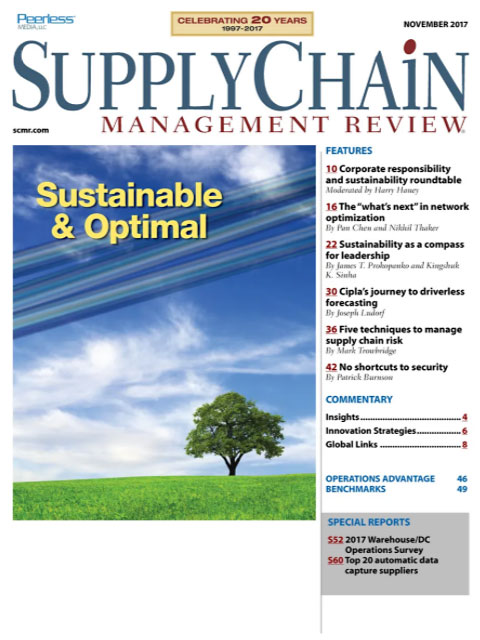Sorry, but your login has failed. Please recheck your login information and resubmit. If your subscription has expired, renew here.
November 2017
There are strands of sustainability and corporate responsibility through much of this month’s issue. James T. Prokopanko, the former CEO and president of The Mosaic Company, details how corporate responsibility became his compass for leader ship when he took over the reins of the company back in 2007. Similarly, Joseph Ludorf, the executive director of supply chain for Cipla Medpro, details how revamping the planning process enables the South African pharmaceutical company to prof- itably supply drugs to underserved populations on the continent as part of its corporate mission. We round out the issue with five tips for intelli- gent risk taking in… Browse this issue archive.Need Help? Contact customer service 847-559-7581 More options
I joined the supply chain community in 1990, following my initial career in marketing. SCM has been my profession since.
My first position was in Arthur Andersen’s Logistics Strategy Practice, part of the consulting group that eventually evolved and spun out from the accounting firm into Accenture’s supply chain management (SCM) practice. I was fortunate to be in the right place at the right time. The rise of globalization and consumerism led to the evolution of global supply chains that strived to source, transport, make and deliver goods from any country in the world and to sell in any other. Like many of my colleagues, I felt like we were solving world hunger and raising the economic conditions of citizens around the globe.
Using practices such as just-in-time, integrated operations and cross-functional business processes, we developed highly efficient and effective supply chain operations to meet the global demand for goods and services. In the United States we helped to satisfy the demand from affluent American consumers for products from faraway places. Our European colleagues did the same for their countries’ appetites for imported goods and services.
Initial doubts about outsourcing
Without question, outsourcing played an important part in the evolution to global supply chains. Thorough analysis and planning needs to be done on what to outsource, but given my history, I’ve been an advocate of outsourcing, when it makes business sense. I’ve argued with naysayer friends that companies were just outsourcing low-paying, low-skilled jobs, while at the same time growing the highly-skilled, high-paying jobs that Americans needed to maintain their opulent lifestyles.

This complete article is available to subscribers only.
Log in now for full access or start your PLUS+ subscription for instant access.
SC
MR
Sorry, but your login has failed. Please recheck your login information and resubmit. If your subscription has expired, renew here.
November 2017
There are strands of sustainability and corporate responsibility through much of this month’s issue. James T. Prokopanko, the former CEO and president of The Mosaic Company, details how corporate responsibility… Browse this issue archive. Download a PDF file of the November 2017 issue.I joined the supply chain community in 1990, following my initial career in marketing. SCM has been my profession since.
My first position was in Arthur Andersen's Logistics Strategy Practice, part of the consulting group that eventually evolved and spun out from the accounting firm into Accenture's supply chain management (SCM) practice. I was fortunate to be in the right place at the right time. The rise of globalization and consumerism led to the evolution of global supply chains that strived to source, transport, make and deliver goods from any country in the world and to sell in any other. Like many of my colleagues, I felt like we were solving world hunger and raising the economic conditions of citizens around the globe.
Using practices such as just-in-time, integrated operations and cross-functional business processes, we developed highly efficient and effective supply chain operations to meet the global demand for goods and services. In the United States we helped to satisfy the demand from affluent American consumers for products from faraway places. Our European colleagues did the same for their countries' appetites for imported goods and services.
Initial doubts about outsourcing
Without question, outsourcing played an important part in the evolution to global supply chains. Thorough analysis and planning needs to be done on what to outsource, but given my history, I've been an advocate of outsourcing, when it makes business sense. I've argued with naysayer friends that companies were just outsourcing low-paying, low-skilled jobs, while at the same time growing the highly-skilled, high-paying jobs that Americans needed to maintain their opulent lifestyles.
 SUBSCRIBERS: Click here to download PDF of the full article.
SUBSCRIBERS: Click here to download PDF of the full article.
SC
MR


Latest Supply Chain News
Latest Podcast

 Explore
Explore
Business Management News
- Strengthening customer fulfillment: Building a strategic stakeholder network
- The hard job of teaching soft skills
- Trump picks former Wisconsin congressman Sean Duffy for DOT secretary
- Made in Mexico, manufactured by China
- Retail sales see gains in October, reports Commerce and NRF
- Balancing green and speed: Home delivery insights from the pandemic era
- More Business Management
Latest Business Management Resources

Subscribe

Supply Chain Management Review delivers the best industry content.

Editors’ Picks





